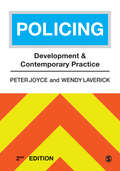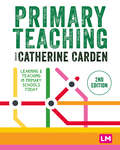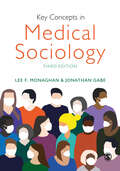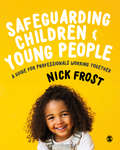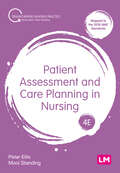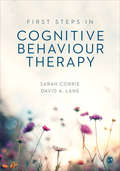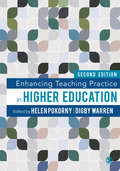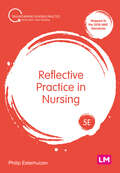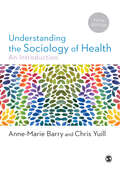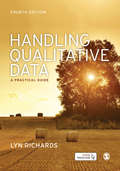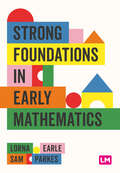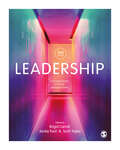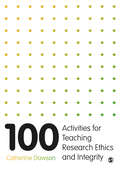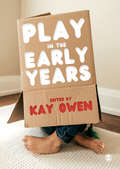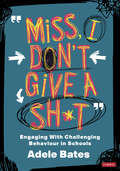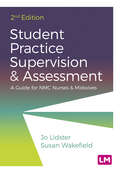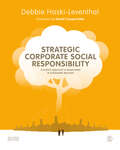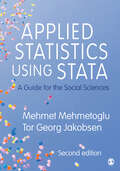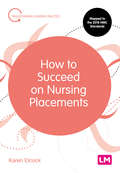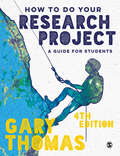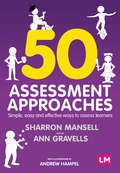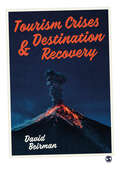- Table View
- List View
Mastering Writing at Greater Depth: A guide for primary teaching
by David Waugh Adam Bushnell Rob Smith Angela GillTo master the teaching of writing at greater depth, teachers first need to know: *What makes writing ′greater depth′? *What does it looks like? *How do I support children to develop the skills and creativity to be able to write at ′greater depth′? Official guidance lacks the substance and clarity that is needed so where do teachers go for support? This book provides teachers with support, guidance, background theory, examples and practical advice for the teaching of writing at greater depth. The text highlights the need to take writing beyond transcription into creative composition - and not only shows how this is possible, but also explores why it matters. The second edition is updated with new questions for discussion supporting teacher professional learning and links to the ITT Core Content Framework for trainee teachers.
Policing: Development and Contemporary Practice
by Peter Joyce Wendy LaverickA comprehensive introduction to policing in England and Wales, providing you with an in-depth understanding of the challenges and complexities of modern policing and an increased awareness of the history and development of the profession. This second edition covers the most pressing debates and issues associated with contemporary policing and examines a range of key topics such as methods of policing, diversity and the police, police accountability, and much more. The new edition includes: A new chapter on women in policing Expanded content on diversity issues within the police service An account of the changes to transnational policing as a result of Brexit Reflections on the use of social media by police Advice for those wanting to embark on a career in the field. Written in an introductory way that is ideal for any policing, criminology, or criminal justice student new to police studies.
Primary Teaching: Learning and teaching in primary schools today (Primary Teaching Now)
by Catherine CardenThe second edition of this core text from Learning Matters asks: What is teaching? Does curriculum really matter? Does behaviour need ′managing′? What is a learning environment today? Does my classroom reflect the identities of all of my learners? How can I bring the theme of sustainability to my teaching? Discussing these and many more, it covers the contents of professional studies modules and goes beyond to support trainees on placements and in their learning on the course. Five new chapters are added for this edition discussing themes of sustainability, teacher self care, diversity in the curriculum, sex and relationships education and our new understanding of learning environments. Learning features throughout have been designed to help students develop their understanding, broaden their perspectives, think more critically and apply theory to practice. These include: Case Studies to apply learning to real-life school contexts. Key Readings to encourage wider reading, broaden perspectives and offer practical ideas for the classroom. Key Theory features introduce and summarise big ideas, theories and research. Critical Questions direct reflection, help students engage with what their reading and encourage critical responses. Classroom Links highlight good practice, provide practical ideas and show how to implement these in the classroom. Assignment features offer helpful points to consider and practical advice for writing assignments on chapter topics, which act as great starting points.
Key Concepts in Medical Sociology (SAGE Key Concepts series)
by Lee F. Monaghan Jonathan GabeHow do we understand health in relation to society? What role do social processes, structures and culture play in shaping our experiences of health and illness? How do we understand medicine and healthcare within a sociological framework? Drawing on international literature and examples, this new edition of Key Concepts in Medical Sociology: · Systematically explains the concepts that have preoccupied medical sociology from its inception, and which have shaped the field as it exists today. · Includes new entries, such as pandemics and epidemics, the environment, intersectionality, pharmaceuticalization, medical tourism and sexuality. · Begins each entry with a definition of the concept then examines its origins, development, strengths and weaknesses, and concludes with suggested further reading for independent learning. Key Concepts in Medical Sociology is essential reading for students in medical sociology as well as those undertaking professional training in health-related disciplines.
Safeguarding Children and Young People: A Guide for Professionals Working Together
by Nick FrostSafeguarding Children and Young People offers students and practitioners an accessible and multi-disciplinary guide to working together with other professionals to deliver a child-centred and co-ordinated approach to safeguarding, in line with the Working Together to Safeguard Children guidance. Taking a ‘whole systems’ approach, and offering support on prevention, assessment, intervention, systems, and leadership, the book reflects on recent challenges including contextual abuse, child sexual exploitation and cyber-abuse. The book includes case studies, activities and points for reflection to aid learning and test understanding.
Patient Assessment and Care Planning in Nursing (Transforming Nursing Practice Series)
by Peter Ellis Mooi StandingThe fourth edition of this bestselling textbook builds your skills for accurate, person-centred assessment and care planning. Working step-by-step through the process, it equips you with practical assessment tools and models for care planning. Its holistic approach helps you to think in the round about an individual’s physical health, mental health and other needs, as well as the broader social and environmental factors that influence their lives and care. Fully updated in line with contemporary evidence-based practice, this book will support you through your assignments, placements and into your nursing career. Key features: • Each chapter is mapped to the 2018 NMC Standards • Introduces commonly used assessment tools alongside broader considerations, including preventative healthcare assessment and acting in a patient′s best interests. • Scenarios and case studies illustrate theory, principles and complex assessment • Develops the critical thinking and decision-making skills which are essential for effective practice
First Steps in Cognitive Behaviour Therapy
by Sarah Corrie David A. LaneThis book is a first steps introduction to cognitive behaviour therapy that will appeal to the interested reader and professionals wanting to learn about the approach. It introduces you to the history of the approach, describes its behavioural and cognitive principles, and examines key techniques and methods within the context of contemporary practice. Further chapters on Formulation, Working with Imagery, and Future Directions in CBT help you to extend your learning, while reflective activities and case studies throughout the book support you to apply principles and perspectives to practice.
Enhancing Teaching Practice in Higher Education
by Tom Burns Sandra Sinfield Steven Cranfield Helen Pokorny Digby Warren Ben Goldsmith Dave Griffiths Sarah Flynn Debbie Holley David Fevyer Kathy Harrington Susannah McKee Matt Scandrett Julian Ingle Sibyl Coldham Pauline Armsby Johanna Payton Jennifer Bright Rebecca EliahooThis book integrates a wide body of theory and pedagogical research to enrich and empower teaching in universities, with a focus on transformational practice and education for social justice. In this fully updated second edition, you will be provided with ideas and practical strategies drawn from literature and real-life experience across a range of academic disciplines. This second edition includes: · Two new chapters on: inspiring learning through technologies, and holistic and creative pedagogies · Approaches to decolonising the curriculum and working with student diversity and partnership · Innovations in learning environments including responses to the pandemic, university writing and developing learning through, and for, work · A new feature: case studies in every chapter to illustrate theoretical ideas across disciplines
Reflective Practice in Nursing (Transforming Nursing Practice Series)
by Philip EsterhuizenReflection is key to making sense of your practice experiences. This book will build the reflective skills you need to succeed in your studies and to become a reflective practitioner. Learn the principles of reflective practice and how to apply them, enhancing your personal and professional development and ultimately the care you provide. Key features o Each chapter is mapped to the 2018 NMC standards o Covers models and frameworks of reflective practice in clear, straightforward language o Activities and case studies show reflective practice in action and help you begin to reflect on your own experiences
Understanding the Sociology of Health: An Introduction
by Chris Yuill Anne-Marie BarryWhy do health inequalities exist? How do gender, sexuality, race, ethnicity or class affect health? What is the healthcare impact of technology? How does climate change relate to health and illness and what does sociology have to teach us about pandemics? This textbook exists to answer these complex questions providing a complete overview of all the key sociological debates, themes, theories and research. Key features: Takes a global perspective providing comparative examples throughout Grapples with the most pressing healthcare debates including climate change and environment, pandemics and society, racism, health inequality and gender identity Breaks the complexities down using extremely clear language throughout Lecturers and instructors can also access a range of additional teaching resources available from the SAGE website. Though aimed primarily at students on health and social care courses and professions allied to medicine, this textbook provides valuable insights for anyone interested in the social aspects of health.
Handling Qualitative Data: A Practical Guide
by Lyn RichardsViewing data as the heart of qualitative research, this book provides clear guidance on the steps involved in collecting and managing primary & secondary data while equipping you with a toolkit that they can apply to data in any context. In her positive and jargon-free style, the author discusses how setting up, working with, making sense of and presenting data can be a springboard into learning key research skills and reflecting on methodological issues. New to this edition: Ethical practice learning features, such as exercises and reflective questions Thoughtful guidance on the newer challenges in handling qualitative data, like data security and access to online data New chapters provide clear advice on communicating data to different audiences, and creating impactful data visualizations Online resources that illustrate how to work with data in real research projects; including a ‘stepping into software’ space that provides practical tips and guidance on using qualitative analysis software effectively
Strong Foundations in Early Mathematics
by Lorna Earle Sam ParkesDeveloping the building blocks for mathematics. This book supports early years teachers and practitioners to enable children to build Strong Foundations in Mathematics. It focuses on children′s learning and development in mathematics in the critical reception year. It supports trainee teachers and early years students to reflect on their own mathematics learning and how this influences their teaching and subject confidence. It acknowledges the uniqueness of the early years and explores the mathematical pedagogies of the EYFS. Importantly, the book challenges the assumption that early years mathematics is ′not proper maths′.
Leadership: Contemporary Critical Perspectives
by Scott Taylor Jackie Ford Brigid CarrollWritten by a team of international experts and taking a truly global approach, Leadership: Contemporary Critical Perspectives is the essential guide to key concepts and contemporary concerns in leadership studies. This third edition has been revised and expanded to improve accessibility to complex theory and add cutting-edge content, including: • Three new chapters on how leadership shapes the spaces we live and work in, leadership during crisis, and populism and conspiracy theories in leadership • A range of new case studies focussing on world-renowned leaders such as Greta Thunberg, Mark Zuckerberg and Donald Trump • An updated ‘Leadership on Screen’ feature that looks at examples of leadership in film and TV, including Parasite and Peaky Blinders This comprehensive yet engaging text is suitable for leadership students at both undergraduate and postgraduate level. Instructors can visit the companion website to access valuable online resources, including PowerPoints for each chapter and carefully selected content from the SAGE Business Cases platform. Brigid Carroll is Professor in the Department of Management and International Business and holds the Fletcher Building Employee Educational Fund Chair in Leadership in the Faculty of Business and Economics at the University of Auckland, New Zealand. Jackie Ford is Professor of Leadership and Organization Studies at Durham University Business School, UK. Scott Taylor is an Associate Professor in Leadership and Organization Studies at Birmingham Business School, University of Birmingham, UK.
100 Activities for Teaching Research Ethics and Integrity
by Catherine DawsonThis practical, user-friendly guide consists of 100 original activities that have been designed to inspire and support educators of research ethics and integrity at undergraduate and postgraduate level. Focussing on eight key areas, activities include: • Respecting human dignity, privacy and rights • Obtaining informed consent in the digital world • Capturing data on sexual orientation and gender identity • Recognizing and addressing bias when collecting data • Creating social change through research practice • Assessing the ethical implications of data sharing. Complete with detailed teaching notes and downloadable student handouts, as well as guidance on the type and level of each activity, 100 Activities for Teaching Research Ethics and Integrity is an essential resource for both online and face-to-face teaching.
Play in the Early Years
by Kay OwenPlay in the Early Years provides an accessible overview of key concepts, debates and approaches to children’s Play. This book: · Considers play from a variety of perspectives · Offers expert insights into theory and research in each area · Encourages the reader to critically reflect on both theory and practice With features including key terms, case studies, reflective questions, spotlights on research and an accompanying glossary, this text is perfect for everyone who is interested in Play - from those just starting undergraduate degrees through to those with more advanced knowledge or experience.
"Miss, I don’t give a sh*t": Engaging with challenging behaviour in schools (Corwin Ltd)
by Adele BatesDo you want to be an inspiring teacher for everyone you teach, even the trickier cherubs in your class? Or maybe you just want to get through a lesson without a desk flying at you or a blazer being set alight? In this down-to-earth book Adele Bates shares practical approaches, strategies and tips from the classroom on how to help pupils with behavioural needs thrive with their education. Packed full of real-life classroom scenarios, student voice and relevant theory, every chapter offers an Action Box helping you to implement these strategies – next lesson, next week and long term. From relationship building and teaching self-regulation, to fostering inclusivity, paying attention to your own self-care and schoolwide approaches, Adele Bates unpicks some of the most difficult aspects of being a teacher and empowers you to grow as a confident classroom professional.
Student Practice Supervision and Assessment: A Guide for NMC Nurses and Midwives
by Jo Lidster Susan WakefieldSupervising and assessing students in practice is central to the nursing and midwifery role. Based around the NMC Standards for Student Supervision and Assessment (2018) and with a brand new chapter on coaching, this book will develop and enhance your knowledge and skills in order to support a wide range of students. Updated throughout to reflect what has been learned from the early roll-out of supervisory and assessor roles, this is the book you will keep returning to as you encounter different students and scenarios in your practice. Key features o New chapter on coaching o Each chapter is mapped to the 2018 NMC standards o Case studies, activities and other learning features help you to translate theory into practice o Explores challenging issues such as students in difficulty o Considers the personal development of practice supervisors and assessors, whether new to this role or an experienced supervisor and assessor Dr Jo Lidster is Deputy Head of the Department of Nursing and Midwifery at Sheffield Hallam University Susan Wakefield is Head of the Department of Nursing and Midwifery at Sheffield Hallam University
Strategic Corporate Social Responsibility: A Holistic Approach to Responsible and Sustainable Business
by Debbie Haski-LeventhalWith the changing expectations of consumers, employees and regulators, being best in the world is no longer enough. Businesses are now also expected to be best for the world: to be socially and environmentally responsible, sustainable and ethical. Based on the idea that strategic CSR offers the most holistic and effective approach to corporate social responsibility, the author presents the key concepts, theories and philosophical approaches to CSR, along with the practical tools needed to implement this knowledge in the real world. The book is split into three parts; the first part provides the theoretical background of CSR, the second part examines various CSR approaches and how they can be implemented, and the third part discusses measuring and communicating CSR. New this edition is also a chapter titled ‘The S in CSR: Social and Global Issues’. Each chapter contains questions for reflection & discussion, exercises, and case studies from globally recognised brands such as Ben & Jerry′s, Google, H&M, Johnson & Johnson, Nestlé, Patagonia, Puma, Unilever and Whole Foods. The book is complemented by chapter specific lecturer PowerPoint slides, a draft syllabus and an instructor′s manual. Suitable reading for students on Corporate Social Responsibility modules.
Children Reading for Pleasure in the Digital Age: Mapping Reader Engagement
by Teresa Cremin Natalia KucirkovaWhat does it mean to become a reader? What are the challenges and opportunities of engaging children in reading for pleasure in the 21st century? This book explores the ways in which reading for pleasure is changing in the era of globalisation, multiculturalism and datafication. Raising the next generation of engaged readers requires knowledge of the enduring characteristics of engagement and markers of quality in books and e-books. In addition, in order to develop new insights into children’s experience of reading on and off screen, nuanced understandings of psychological and socio-cultural research are offered. The cross-disciplinary examination integrates key research from educational psychology, new literacies, multimodality and socio-cultural perspectives and explores consequences for practice. An authoritative guide - it invites graduates, researchers and teachers to participate in the authors’ interdisciplinary dialogue about reading for pleasure.
Applied Statistics Using Stata: A Guide for the Social Sciences
by Mehmet Mehmetoglu Tor Georg JakobsenStraightforward, clear, and applied, this book will give you the theoretical and practical basis you need to apply data analysis techniques to real data. Combining key statistical concepts with detailed technical advice, it addresses common themes and problems presented by real research, and shows you how to adjust your techniques and apply your statistical knowledge to a range of datasets. It also embeds code and software output throughout and is supported by online resources to enable practice and safe experimentation. The book includes: · Original case studies and data sets · Practical exercises and lists of commands for each chapter · Downloadable Stata programmes created to work alongside chapters · A wide range of detailed applications using Stata · Step-by-step guidance on writing the relevant code. This is the perfect text for anyone doing statistical research in the social sciences getting started using Stata for data analysis.
How to Succeed on Nursing Placements (Transforming Nursing Practice Series)
by Karen ElcockFeel confident and fully prepared on your nursing placements with this invaluable guide to one of the most important aspects of your nursing course. Covering the what, why and how in easily accessible language, this book explores the common challenges faced by nursing students on placement and gives you practical advice on how to overcome them. Written by a team of experienced lecturers and nurses, the book covers everything from developing resilience to reflecting on your experience and preparing for employment, enabling you to make the most of your time on placement. Key features - Fully mapped to the new NMC standards of proficiency for registered nurses (2018) - Case studies, activities and other learning features help you translate the theory to practice - A practical guide to help you gain the most from your placement
How to Do Your Research Project: A Guide for Students
by Gary ThomasStarting your research project can feel daunting, but this best-selling project guide has your back! Now in its fourth edition, the book provides easy to follow advice to navigate every step of your research project, from choosing your research question, deciding on your research design and methodology, collecting and analysing your data, and writing up your finished project. Presenting a clear and detailed roadmap to ensure you don’t miss a step, the book includes: • Case studies and real-life examples from a range of disciplines so you can learn from other researchers who have been in your shoes • DIY activities so you can practise your skills and get to grips with key concepts • Practical advice on how to organise your writing, develop your flow and build strong arguments • Further guidance on assessing ethical risk, including examples of high, medium, and low risk projects Written in Gary’s signature straightforward style, this book is an essential companion for anyone undertaking a research project in the applied social sciences.
Visual Methodologies: An Introduction to Researching with Visual Materials
by Gillian RoseHave you found some exciting images that you want to explore but don’t know how to start your research or what methods to choose? Do you have a question about an aspect of visual culture that you want to answer? Whatever level of experience you have, this classic text will provide you with the key skills you need to complete a visual methods research project, understand the rationale behind each step, and engage with the contexts and power relations that shape our interpretation of visual images. With a clear step-by-step approach that is easy to dip in and out of, the book features: •Key examples in every methods chapter to demonstrate how the methods work in practice and with different visual materials •‘Focus’ and ‘Discussion’ features that help you practice your skills at specific parts of the methods and understand some of the method’s complexities •Guidance on researching using digital visual media, such as Instagram and TikTok, integrated throughout the book This bestselling critical guide is the perfect companion to visual methods projects for undergraduates, graduates, researchers and academics across the social sciences and humanities.
50 Assessment Approaches: Simple, easy and effective ways to assess learners
by Ann Gravells Sharron Mansell Andrew HampelThis reader-friendly and accessible text introduces 50 assessment approaches, and explores how they work in practice by taking an honest look at the advantages and disadvantages of each one. For each approach, the authors include in-practice examples taken from a range of teaching contexts. The book provides valuable ideas and tips for new and existing teachers and assessors. The text explores the advantages and disadvantage of every approach, equipping teachers with the knowledge to assess and select the correct approach for their subject and their learners. If you are a new or beginning teacher looking for new approaches to assessment to use with your learners today - this is the book you need.
Tourism Crises and Destination Recovery
by David BeirmanAs global tourism faces its greatest threat since World War II, the author draws on over 40 years of industry and academic experience to explore the core themes that underpin crises, their impact on the tourism industry and recovery. Focussing on this emerging issue in within the travel industry and academic tourism research, this author explores crisis management approaches from scholars, governments and tourism associations around the world. A dedicated chapter also covers the impact of Covid-19 on tourism industries and economies across the world and well as how nations from around the world responded to the global pandemic outbreak. The book is split by theme and features over 20 case studies, including 2020 Australian bush fires, 2019 Sri Lankan terror attack, SARS and Swine Flu, the collapse of Thomas Cook, the global and Greek financial crises and the threat to the Great Barrier Reef. Discussion questions and activities are included at the end of each chapter. Suitable reading for students on tourism and tourism crisis management modules.

